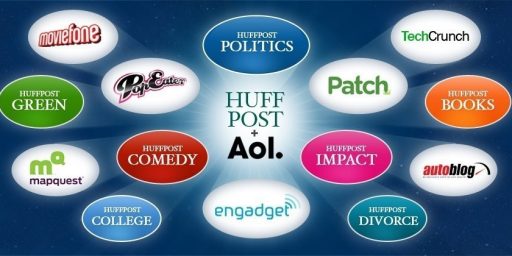Writing for Free Doesn’t Pay Well
It's hard to get paid for work others will do for nothing.
HuffPo has fired back in the lawsuit seeking to retroactively change the agreement it made with unpaid contributors:
Lawyers for The Huffington Post have moved to dismiss Jonathan Tasini’s novel lawsuit claiming that the popular internet newspaper actually owes money to its unpaid bloggers. Tasini got exactly what he was looking for from his free blogging, HuffPo lawyers argue—exposure—and his lawsuit insisting on payment must be thrown out.
Tasini’s lawsuit, filed last month, is asking the court to make “a remarkable and unwarranted intrusion into the relationship between publishers and contributors,” write HuffPo lawyers in a just-filed motion to dismiss.
The motion argues that Tasini’s novel legal claim of unjust enrichment has to be thrown out, because Tasini and HuffPo had a written agreement—the site’s terms and conditions. Those terms give HuffPo the right to publish (and re-package, and re-publish) content from bloggers, without compensation. Tasini willingly wrote more than 200 blog posts for HuffPo, knowing full well that he was doing so in exchange for nothing more than exposure. Thus, Tasini’s claims “not only are entirely without legal merit, but are incurably so,” and must be thrown out, the motion states.
HuffPo lawyers note that Tasini’s complaint even emphasizes that HuffPo promised “exposure (visibility, promotion, and distribution) in lieu of monies”—and unpaid bloggers, including Tasini, did in fact receive exposure.
Tasini gained a modicum of fame a decade ago when he successfully sued the New York Times to require a second payment to freelance writers for articles posted on paid databases like LexisNexis. But that case hinged on copyright terms. Here, HuffPo is using the work precisely as they promised to do (posting it on HuffPo) and paying precisely what it agreed to pay (nothing). And the writers retain full rights to publish the work elsewhere, as many do.
He alleges that HuffPo’s large market share and its ability to hire legions of quality writers for free is “having a serious depressing effect on the value of intellectual content being created” and therefore making is more difficult “to support themselves as creators of high quality, engaging, digital content.” And he’s right! But that would be true if HuffPo were paying minimum wage.
Aside from the legalities of contract law, this is simply the nature of the enterprise. There are all manner of prestige outlets who both have paid staffs and publish work from unpaid contributors. Most of the pieces I write for venues like The Atlantic, Foreign Policy, The National Interest, and the like are published without any expectation of financial reward. The major op-ed pages have extremely accomplished people vying to place pieces; few if any of them pay. Similarly, the more prestigious broadcast outlets don’t pay their guests. Prestige, exposure, ego, resume fodder and other factors are the only compensation.
The more valuable the guest and the less prestigious the venue, the more likely that financial payment will ensue. The Birmingham News and Montgomery Advertiser pay for feature op-eds. Likewise, many fledgling broadcast networks pay an honorarium to guests. And people who are sought after guests sometimes get elevated to “contributor” status, earning some payment for appearing exclusively on one outlet.
Most people who write and talk for free will never make more than token money for these endeavors. Traditionally, this meant the endeavor was mostly left to academics, policy wonks, and others being paid by a third party for the efforts. With the rise of blogs and other social media outlets a decade ago, though, millions of amateurs joined the fray. While hundreds of people have used these platforms as a launching pad to professional careers, most will remain hobbyists or lose interest.
If Tasini and company aren’t happy with the exposure they get producing free content for Ariana Huffington/AOL, then they should quit publishing it there. Perhaps they could start up their own sites and try to build an audience. Or try to find someone to pay them for their work. Maybe they’ll strike it rich. Or, just maybe, they’ll find out they were already getting paid what they were worth.







What da ya want for nothing? … a rrrrrrrrubber biscuit? …
I suspect that’s the case. I hope you and your OTB crew here get fabulously wealthy . . . and pay lots of taxes on that wealth. Good luck.
James,
We’re just waiting for the precedent to be set, then we’re coming after you and the millions OTB owes to the traffic driving commentators.
On a slightly more serious note about all this… The age (if it ever really existed, I look to MR to answer this) of a writer living by writing short form original content (as opposed to work for hire) is generally drawing to a close.
It seem like we’re moving back to mid-to-late 19th century, where writing primarily served as a way to build fame which tied into speaking and other gigs. Performance is where the money was at, as opposed to straight content.
That said, in cases like you’ve mentioned James, whether its the Atlantic or the HuffPost, when articles are being written for free, do you think that ideas around “ownership” of that content should change? For example, should the writer retain partial ownership of the writing — allowing them (or rather you) to be able to republish it in whatever forms you see fit without having to license it from the organization that “published” it?
Huff and Puff to Tasini: How DARE you be a (Uggh) Capitalist!
@mattb: In most cases, the authors retain copyright. Indeed, there’s almost never a contract.
@Eric: HuffPo isn’t saying he can’t be a capitalist–just that he shouldn’t expect to get paid for work he agreed to do for free because he’s changed his mind. They wouldn’t have published it under that condition.
James,
Thought that was the case, but couldn’t find the contracts online.
So, just to be sure, with the stuff you wrote for the Atlantic, you still own that work? If they were to reprint the material in the print pub, do they have to come back to you for permission? Or, when you publish “The Collected Works of James Joyner,” do you need to get their permission to include that essay?
– Matt
On the other hand, I believe that Bloggers, journalist, newspaper opinion writers and editors, columnist and political commentators write to impress each other. It’s a mutual admiration society, so to speak. I don’t think they write to educate the great-unwashed plebian masses.
I’ve written a lot of different things — books, blogs, restaurant reviews, political ads, feature pieces, stuff I can’t remember (I once wrote a brochure for the giant wooden spools they use for cable) — and generally speaking I’ve wanted to get paid. But that isn’t always up to me. There’s the market to consider.
If a million guys will write opinion pieces roughly equivalent to mine, and do it for nothing, then the cash value of my piece is zero. There’s no point whining about the marketplace, the marketplace doesn’t give a damn what I want.
There’s a sort of algorithm with elements of cash, benefits (free meals while reviewing restaurants,) respect, fame, sharpening of skills and plain old fun. Write, don’t write, it’s a different answer for every situation.
We are in the middle of a writing revolution as big as anything since Gutenberg. My approach has been to welcome my new insect overlords and try to find a way to come out on top. So far so good — I could keep a pair of me clones busy writing full time. My wife is similarly buried in work. And if things go as we hope we’ll actually see our incomes rise as we exploit the new environment to grab bigger pieces of e-books, enhanced e-books, games, sponsorships, the overseas market, etc…
Or we end up living off the charity of our children. That’s also a possibility.
Huffington is misrepresenting the actual legal issue here: since the Huffington Post is not paying its contributers, it cannot claim to own the content those writers produce on a work for hire basis. It does not possess the copyright to the articles. That being the case, what is its basis for selling the site to AOL? It can sell the brand name, certainly, but it doesn’t have the legal right to sell content.
It would be the equivalent of lending your car to a friend and then the next day learning they took it to used car dealer and sold it. If you sued them to recover the proceeds of that sale, it would be odd of them to argue that since you had leant them the car for free you have no claim on the proceeds for selling it.
Stormy, Are you positing that Huffpo had first publication rights and then had to get permission to reprint (reprint being a poor term in the digital arena)? Once something is tossed out in the digital ether who has rights to it? Instead of the used car example how about an artist friend gives you a nice sculpture just to clear it out of the studio. A few years later you sell it, do you owe the artist money? Perhaps from a moral standpoint you do but do you legally owe?
What if one of my comments on OTB is simply so brilliant (Hey!) that James includes it in his Collected Wisdom of James Joyner book? Do I get paid? I don’t think so. I “gave” him the comment. I didn’t charge him for it or negotiate the terms. It’s morally iffy but legally I don’t think I’d have much grounds for a lawsuit.
I’ve been going to the Huffington Post since it was founded…and I’ve never read any blog post there.
Are they all that crap on the left side of the page?
@Stormy Dragon: If HuffPo had sold the content to AOL for some new purpose, I’d agree that there might be some basis for complaint (disclaimer: IANAL). But all that’s happened here is that HuffPo changed hands. The content written for HuffPo is still posted at HuffPo, which owns the rights to it. That’s the difference between a sole proprietorship and a corporation; the latter lives on regardless of the individual people who founded and ran the company at any given point in time.
It depends. Am I selling the sculpture, or do I puport to sell the rights to the sculpture? If I sell it to James Joyner so he can put it on his coffee table, then no, I don’t owe the artist anything. If I sell it to Pier 1 so they can start selling replicas of it in their stores, then yes I do owe the artist money.
That’s my point. There’s two different good here. Your comment itself, and the rights to your comment. While putting a comment here could be seen as granting in implicit license to the comment, in the absence of some formal agreement, it generally doesn’t say anything about the rights, which would still remain with you.
Now the questions here are:
1) Was there any sort of more formal agreement between Huffington Post and its contributers that transferred ownership of the rights from the contributers to Huffington Post?
2) Did Huffington Post, in its deal with AOL, purport to transfer those rights from itself to AOL?
3) Is an implicit grant of license presumed to be transferable to a third party, under the circumstance that exist in this case?
Without answering those questions, I can’t really say wether Huffington Post or Jonathan Tasini is right, and they seem to disagree what the answers are. Resolving those sorts of disagreements is exactly why we have courts.
Now you may think one way or the other on the matter, but I think they are legitimate questions and we don’t have enough information to fully answer them, so I don’t know which way the court will ultimately decide.
But I think it’s a legitimate lawsuit.
Stormy:
Hmmm. I think you may be right.
Which is why my publishing lawyer doesn’t let me negotiate contracts.
Thanks for the clarification. This seems to be like the amateur photo of the shuttle launch shot from a commercial aircraft that went viral.
Nor would Microsoft have hired all those temp workers, a decade or so back. THe similarity in the cases is striking, in the overall. I grant the specifics are perhaps enough to lose the case. But it seems the precedent is there.